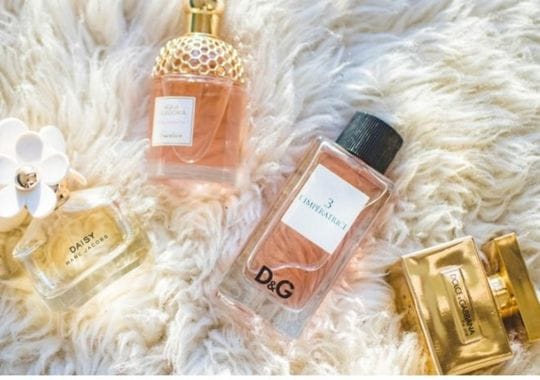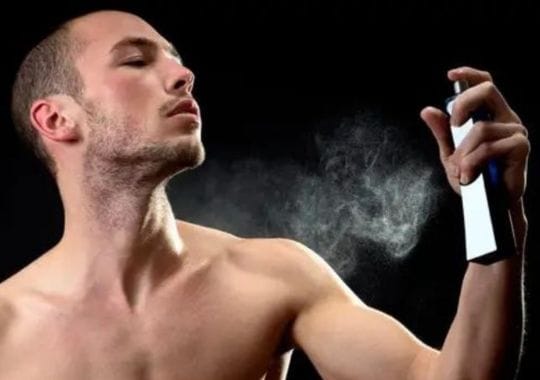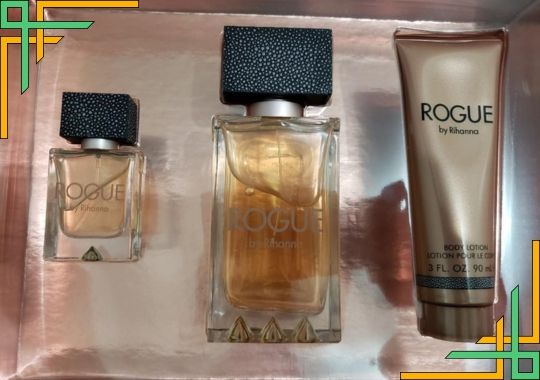Perfumes have a remarkable ability to captivate our senses and leave a lasting impression. We all have our favorite scents, but have you ever wondered What Perfume Is Stronger? The answer lies in perfume strength, a crucial factor that determines the intensity and longevity of a fragrance.
As Amazon affiliates we may earn a commission if you purchase a product at no cost to you.

Watch this amazing video.
What is Perfume Strength?
Perfume strength refers to the concentration of aromatic compounds present in a fragrance. It determines how potent and powerful the scent will be when applied. Perfumes are typically categorized into several concentration levels, each varying in the amount of fragrance oils and alcohol they contain. These concentrations include Eau de Cologne, Eau de Toilette, Eau de Parfum, and Parfum/Perfume Extract.
Let's take a closer look at each concentration level:
- Eau de Cologne: This concentration has the lowest perfume strength, usually ranging from 2% to 5%. Eau de Cologne is known for its fresh and light composition, making it ideal for a refreshing spritz during warmer seasons.
- Eau de Toilette: With a slightly higher concentration of fragrance oils, ranging from 5% to 15%, Eau de Toilette offers a moderate strength. It strikes a balance between freshness and longevity, making it a popular choice for everyday wear.
- Eau de Parfum: Stepping up in strength, Eau de Parfum contains a higher concentration of fragrance oils, typically between 15% and 20%. This concentration offers a more intense and longer-lasting scent, perfect for special occasions or those who prefer a stronger fragrance experience.
- Parfum/Perfume Extract: The most potent and luxurious concentration, Parfum/Perfume Extract boasts the highest fragrance oil concentration, often exceeding 20%. This concentration provides an exceptionally rich, long-lasting scent, reserved for true fragrance connoisseurs.

Importance of Perfume Strength
Understanding perfume strength is crucial for several reasons. Firstly, it allows you to select a fragrance that aligns with your personal preferences. Whether you prefer a subtle scent or a bold statement fragrance, knowing the perfume strength helps you make an informed decision.
Secondly, perfume strength determines the longevity and sillage (the trail of scent left behind) of a fragrance. Perfumes with higher concentrations, such as Eau de Parfum and Parfum/Perfume Extract, tend to last longer on the skin and leave a more pronounced trail, ensuring your scent lingers throughout the day.
Furthermore, perfume strength influences the application technique. Fragrances with lower concentrations, like Eau de Cologne and Eau de Toilette, are often applied more liberally to achieve the desired scent intensity. In contrast, perfumes with higher concentrations require fewer sprays due to their stronger nature.
Understanding perfume strength is essential for selecting a fragrance that suits your preferences and ensures the desired scent experience. Whether you opt for a subtle aroma or a bold fragrance statement, the concentration of aromatic compounds plays a pivotal role. Now that we have explored the concept of perfume strength and its significance, let's delve deeper into the factors that affect perfume strength in the following sections.
Understanding Perfume Concentrations
Perfume concentrations play a significant role in determining the strength and longevity of a fragrance. Different concentrations contain varying amounts of aromatic compounds, resulting in distinct scent intensities. Let's explore some common perfume concentrations:
Rihanna Riri Eau De Parfum Spray for Women
Rihanna Riri Eau De Parfum Spray for Women is a popular fragrance that falls under the Eau de Parfum concentration. This perfume is known for its captivating blend of fruity and floral notes, creating a delightful and alluring aroma. With an Eau de Parfum concentration, Rihanna Riri offers a strong and long-lasting scent experience, making it perfect for special occasions or those who prefer a more intense fragrance.
Eau de Toilette
Eau de Toilette is a commonly found perfume concentration. It typically contains a moderate concentration of fragrance oils, usually ranging from 5% to 15%. Eau de Toilette fragrances strike a balance between freshness and longevity, making them suitable for everyday wear. They provide a pleasant scent experience that is not overpowering, allowing the wearer to enjoy the fragrance without it being too intense.
Eau de Parfum
Eau de Parfum, as mentioned earlier, has a higher concentration of fragrance oils compared to Eau de Toilette. It usually ranges from 15% to 20%, resulting in a stronger and longer-lasting scent. Eau de Parfum is favored by those who desire a more intense fragrance experience. With its higher concentration, a little goes a long way, making it a cost-effective option as well.
Parfum/Perfume Extract
Parfum, also known as Perfume Extract, is the highest concentration of perfume available. It contains the greatest amount of fragrance oils, often exceeding 20%. Parfum offers an exceptionally rich and long-lasting scent experience. Only a small amount is needed for the fragrance to make a powerful impact. This concentration is typically found in luxury fragrances and is favored by those seeking the utmost in fragrance potency and longevity.
Understanding the different perfume concentrations allows you to select a fragrance that aligns with your preferences and the occasion. Whether you prefer a subtle everyday scent or a bold fragrance statement, the concentration of aromatic compounds plays a vital role in achieving the desired fragrance experience. In the next section, we will explore the factors that can affect perfume strength, providing further insights into how scents can vary.
Factors Affecting Perfume Strength
The strength of a perfume can be influenced by various factors that contribute to its composition, quality, application, and even personal body chemistry. Let's explore these factors in more detail:
Fragrance Composition
The composition of a fragrance plays a crucial role in determining its strength. Perfumes are created by combining different aromatic ingredients, including essential oils, synthetic compounds, and other fragrance components. The specific blend and concentration of these ingredients can significantly impact the overall strength of the perfume. Fragrances with a higher concentration of potent notes, such as musk or patchouli, tend to have a stronger scent compared to those with lighter floral or citrus notes.
Ingredients and Quality
The quality of the ingredients used in a perfume can also affect its strength. High-quality ingredients, especially natural essential oils, have a more potent aroma and tend to last longer on the skin. Cheaper or synthetic ingredients may result in a weaker scent and shorter longevity. Perfumes crafted with premium ingredients often have a higher price tag but offer a more intense and long-lasting fragrance experience.
Application Technique
The way you apply perfume can impact its strength on the skin. Fragrances are typically applied to pulse points, such as the wrists, neck, and behind the ears, as these areas generate heat and help disperse the scent. Applying perfume directly onto moisturized skin or after using unscented lotion can also enhance its strength. Additionally, the number of sprays or the amount of perfume applied can affect its intensity. Using a lighter hand and applying a moderate amount can result in a more subtle scent, while a heavier application may create a stronger fragrance presence.
Personal Body Chemistry
Each individual has a unique body chemistry that can interact differently with perfumes. Factors such as skin type, pH balance, and body temperature can influence how a perfume develops and projects on the skin. Some perfumes may naturally amplify or diminish in strength based on an individual's body chemistry. Therefore, a fragrance that smells strong on one person may have a softer presence on another. It's essential to test perfumes on your own skin to gauge how they interact with your body chemistry and determine their true strength.
By considering these factors - fragrance composition, ingredients and quality, application technique, and personal body chemistry - you can better understand why perfumes may vary in strength. It's crucial to select a perfume that aligns with your preferences, taking into account these influencing factors. In the next section, we will compare Eau de Toilette and Eau de Parfum, two common perfume concentrations, to understand their differences in strength and scent longevity.

Comparing Eau de Toilette and Eau de Parfum
When it comes to perfume concentrations, Eau de Toilette (EDT) and Eau de Parfum (EDP) are two commonly encountered options. Understanding the differences between these two concentrations can help you make an informed choice based on your desired scent strength and longevity. Let's explore the comparisons between Eau de Toilette and Eau de Parfum:
Definition and Characteristics
Eau de Toilette is a perfume concentration that typically contains a lower percentage of fragrance oils, ranging from 5% to 15%. It is often described as a lighter and more refreshing version of a fragrance. Eau de Toilette compositions tend to feature a balance of top, middle, and base notes, offering a well-rounded scent profile.
On the other hand, Eau de Parfum has a higher concentration of fragrance oils, generally ranging from 15% to 20%. Eau de Parfum is known for its stronger and more intense aroma. It often features a richer and deeper scent profile, with longer-lasting base notes.
Perfume Strength Comparison
In terms of perfume strength, Eau de Parfum is generally stronger than Eau de Toilette. Due to its higher concentration of fragrance oils, Eau de Parfum offers a more potent scent experience. It has a stronger projection, meaning it is more noticeable to those around you. Eau de Parfum can leave a lasting impression and is often favored for evening events or occasions where a bolder fragrance statement is desired.
Eau de Toilette, while lighter in strength compared to Eau de Parfum, still provides a noticeable scent presence. It is suitable for everyday wear and situations where a more subtle and moderate fragrance is preferred.
Sillage and Longevity Differences
Sillage refers to the trail of scent left behind by a perfume wearer. Eau de Parfum tends to have a more pronounced sillage due to its higher concentration of fragrance oils. The scent lingers in the air for longer periods, creating a noticeable and lingering fragrance trail.
Eau de Toilette, while still having a decent sillage, typically has a lighter and less pronounced trail. The scent projection is milder and doesn't linger as long as Eau de Parfum.
In terms of longevity, Eau de Parfum outperforms Eau de Toilette. The higher concentration of fragrance oils in Eau de Parfum allows the scent to last longer on the skin. It can withstand the test of time and may continue to develop and evolve throughout the day.
Eau de Toilette, while not as long-lasting as Eau de Parfum, still offers a respectable duration. It provides a pleasant fragrance experience that lasts several hours before gradually fading away.
Choosing Between Eau de Toilette and Eau de Parfum
Choosing between Eau de Toilette and Eau de Parfum depends on your personal preferences and the desired fragrance experience. Here are a few factors to consider:
- Scent Intensity: If you prefer a stronger and more intense fragrance that makes a statement, Eau de Parfum is the suitable choice.
- Longevity: If you desire a fragrance that lasts throughout the day without frequent reapplication, Eau de Parfum offers superior longevity.
- Occasion and Season: Eau de Parfum is often favored for evening events or cooler seasons when a richer and more robust scent is appreciated. Eau de Toilette, with its lighter and fresher profile, is well-suited for everyday wear and warmer seasons.
Conclusion
Perfume strength is a crucial factor that determines the intensity and longevity of a fragrance. Understanding the different concentrations, such as Eau de Toilette, Eau de Parfum, and Parfum/perfume Extract, allows you to make an informed choice based on your preferences and desired fragrance experience.
Recommended Article

Frequently Asked Questions FAQs
What is the difference between Eau de Toilette and Eau de Parfum?
Explore the distinctions in concentration and scent intensity between these two popular perfume variants.
How can I maximize the strength of my perfume?
Get valuable tips on applying perfume effectively, layering fragrances, storing perfume properly, and choosing long-lasting scents.
What factors influence perfume strength?
Understand the various factors, such as fragrance composition, ingredients, application technique, and personal body chemistry, that affect the strength of a perfume.











